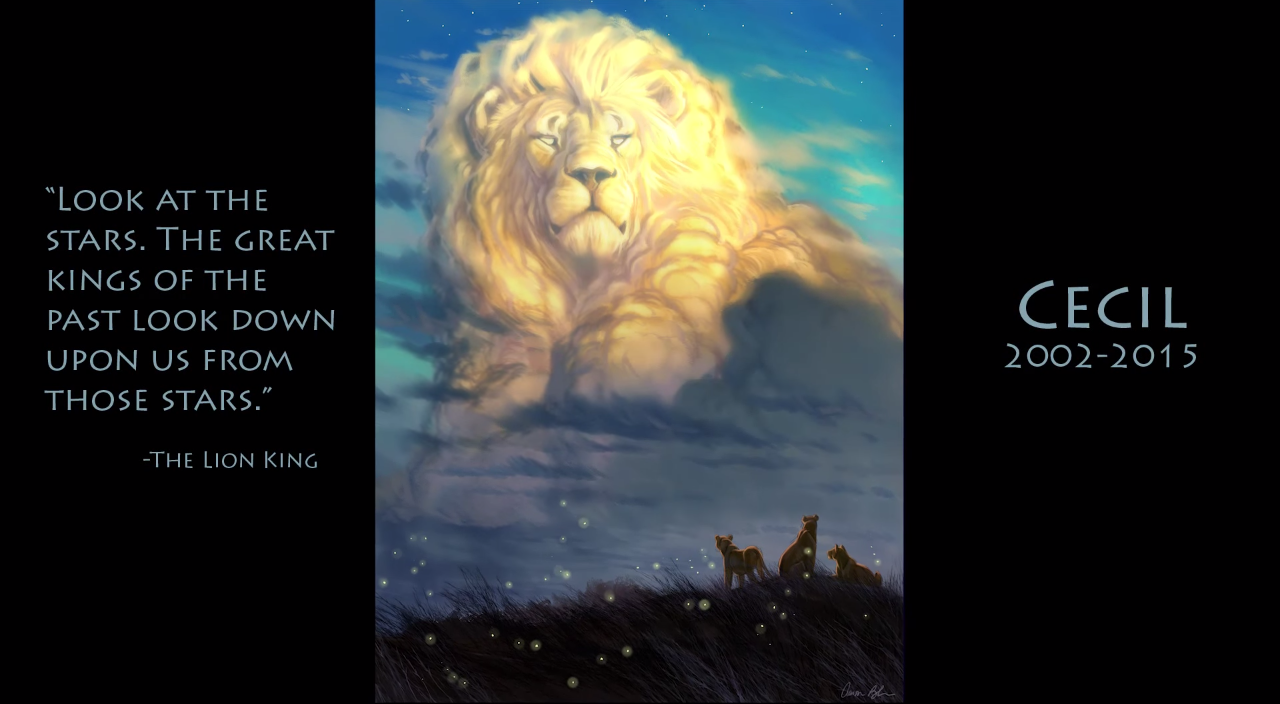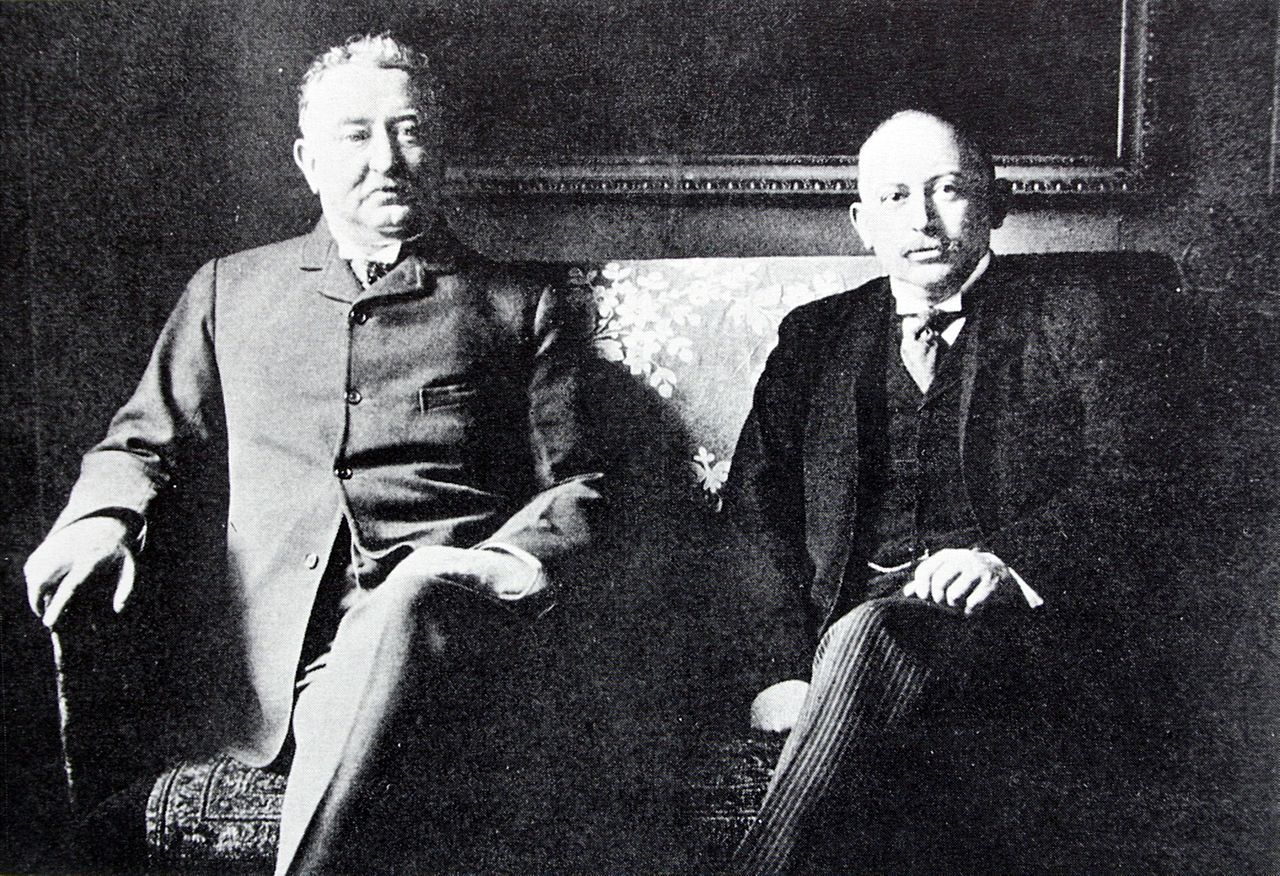
While Former Disney artist Aaron Blaise “honors” Cecil the Lion with a Photoshop-based painting, Zimbabweans remind America that Cecil isn’t Simba.
Blaise was one of the animators responsible for “The Lion King” and a self-described “HUGE animal lover.” He was motivated to create this image by the death of the lion and drew inspiration from an iconic scene in “The Lion King” where the deceased Mufasa took form in the clouds of the night sky.
“Like many people around the world, I was extremely moved by the recent tragedy surrounding the hunting and killing of the beloved lion know as Cecil,” said Blaise. “As you may be able to tell I am a HUGE animal lover and it drives me crazy when I see these beautiful creatures destroyed for no good reason. In fact, I’ve decided to get personally involved and hopefully our efforts can help educate people and prevent these horrible things from happening in the future.”
Watch him create the picture below:
It’s been over a month since the death of the lion named Cecil, yet the mainstream media still won’t let sleeping big cats lie. They would rather perpetually mourn a simple lion rather than cover the videos exposing the deplorable acts and callous attitudes of Planned Parenthood. In fact, the disparity between the coverage of both stories has been cataloged by the Media Research Center (MRC). According to MRC Culture’s Katie Yoder, Cecil has received four times the coverage that the Planned Parenthood videos garnered from networks ABC, NBC and CBS in the three weeks since the first video's release.
They also conveniently gloss over the fact that Cecil was named after liberal British imperialist and diamond mining magnate Cecil Rhodes, who believed that whites were “the finest race in the world” and that “the more of the world we [whites] inhabit the better it is for the human race.”
(Cecil Rhodes, left, with fellow mining magnate Alfred Beit)
“Just fancy those parts that are at present inhabited by the most despicable specimens of human beings what an alteration there would be if they were brought under Anglo-Saxon influence, look again at the extra employment a new country added to our dominions gives.” said Rhodes.
African lions are undeniably important to the African ecosystem, fulfilling the role of an apex predator, and they are listed as a species that is currently "threatened" with extinction. But is this message, that a single lion has more value than the lives and dignity of hundreds of thousands of unborn children, one the media wants to send?
Maybe, we should ask someone from Zimbabwe.
The New York Times recently published an op-ed from Goodwill Nzou, who is a doctoral student in molecular and cellular biosciences at Wake Forest University. He says that Zimbabwean villagers actually cheer the death of a lion. In the village he grew up in, which is surrounded by wildlife conservation areas, lions are “objects of terror.” Menacing killers who were never beloved or given names.
“When I turned on the news and discovered that the messages were about a lion killed by an American dentist, the village boy inside me instinctively cheered: One lion fewer to menace families like mine,” said Nzou. “My excitement was doused when I realized that the lion killer was being painted as the villain. I faced the starkest cultural contradiction I’d experienced during my five years studying in the United States.”
“Did all those Americans signing petitions understand that lions actually kill people? That all the talk about Cecil being ‘beloved’ or a ‘local favorite’ was media hype? Did Jimmy Kimmel choke up because Cecil was murdered or because he confused him with Simba from ‘The Lion King’?”
He recalls how, when he was 9-years-old, a lion preyed upon his village, killing some of their livestock. He says that the lion “sucked the life” out of his village. Everyone lived in fear, women were never left alone and men were armed with machetes and spears.
“When the lion was finally killed, no one cared whether its murderer was a local person or a white trophy hunter, whether it was poached or killed legally. We danced and sang about the vanquishing of the fearsome beast and our escape from serious harm.”
Nzou says that the American tendency to romanticize animals, give them names and fawn over them on social media looks to his eyes like an “absurdist circus.”
“PETA is calling for the hunter to be hanged. Zimbabwean politicians are accusing the United States of staging Cecil’s killing as a ‘ploy’ to make our country look bad. And Americans who can’t find Zimbabwe on a map are applauding the nation’s demand for the extradition of the dentist, unaware that a baby elephant was reportedly slaughtered for our president’s most recent birthday banquet.”
“We Zimbabweans are left shaking our heads, wondering why Americans care more about African animals than about African people.”

